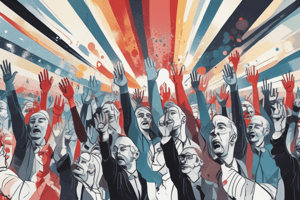Podcast
Questions and Answers
What characterizes democratic systems of government?
What characterizes democratic systems of government?
- Absence of citizens' right to vote
- Limited executive power and strong electoral competition
- Lack of electoral competition and concentration of power
- Regular, free, and fair elections (correct)
Which political philosophy opposes all forms of political authority and advocates for a stateless society?
Which political philosophy opposes all forms of political authority and advocates for a stateless society?
- Authoritarianism
- Anarchism (correct)
- Environmentalism
- Feminism
What distinguishes hybrid systems of government?
What distinguishes hybrid systems of government?
- Absence of civil liberties
- Opposition to war
- Regular, free, and fair elections
- Strong executive power and limited electoral competition (correct)
What is the focus of feminist movements?
What is the focus of feminist movements?
What do international relations seek to explain and predict?
What do international relations seek to explain and predict?
Flashcards are hidden until you start studying
Study Notes
Exploring the Expansive Landscape of Politics
Politics, at its core, is the study and practice of how people make decisions that shape our collective lives. From the local level to the global stage, politics encompasses a wide variety of subtopics, each contributing to our understanding of how societies function and evolve.
Democracy
Democracy, first and foremost, is a system where people have a say in the decisions that affect their lives. This mode of governance is characterized by the principle of popular sovereignty, where power is held by the people, and the government derives its legitimacy from their consent. Democracy fosters transparency, accountability, and the frequent rotation of power through regular and fair elections.
Political Ideologies
Political ideologies serve as lenses through which we view the world and approach common issues. Some prominent ideologies include:
- Liberalism: An ideology that emphasizes individual freedom, economic and political liberalization, and the rule of law.
- Conservatism: A philosophy that promotes the preservation of traditional social institutions, cultural values, and established order.
- Socialism: A political philosophy that advocates greater equality of economic outcomes, primarily through collective or government ownership of the means of production.
- Anarchism: A political philosophy that opposes all forms of political authority and government, advocating for a stateless society organized through voluntary institutions and agreements.
International Relations
International relations encompass the interactions between nations, covering a vast array of issues from diplomacy and foreign policy to trade and security. International relations theory seeks to explain why countries act the way they do in the global arena and to predict how they will respond to various events and situations.
Government Systems
Government systems are the organizational structures that distribute power and authority between institutions and officials. The three most common forms of government include:
- Democratic systems: These systems of government are characterized by regular, free, and fair elections, where citizens have the right to vote and choose their representatives.
- Authoritarian systems: These systems of government are characterized by a lack of electoral competition, restriction of civil liberties, and the concentration of power in the hands of a select few.
- Hybrid systems: These systems of government combine elements of democracy and authoritarianism, typically with strong executive power and limited electoral competition.
Political Movements
Political movements are organized efforts to promote specific policies, ideologies, or causes. Some of the most influential political movements in history include:
- Feminist movements: Efforts to promote gender equality and the rights of women.
- Civil rights movements: Efforts to secure equal rights for marginalized groups, particularly ethnic and racial minorities.
- Environmental movements: Efforts to address environmental challenges and promote sustainable practices.
- Anti-war movements: Efforts to oppose war and promote peace.
In conclusion, politics is a multifaceted field that encompasses democracy, political ideologies, international relations, government systems, and political movements. Studying and understanding these subtopics equips us to better navigate the complex world in which we live and to actively participate in shaping our collective future.
Studying That Suits You
Use AI to generate personalized quizzes and flashcards to suit your learning preferences.




